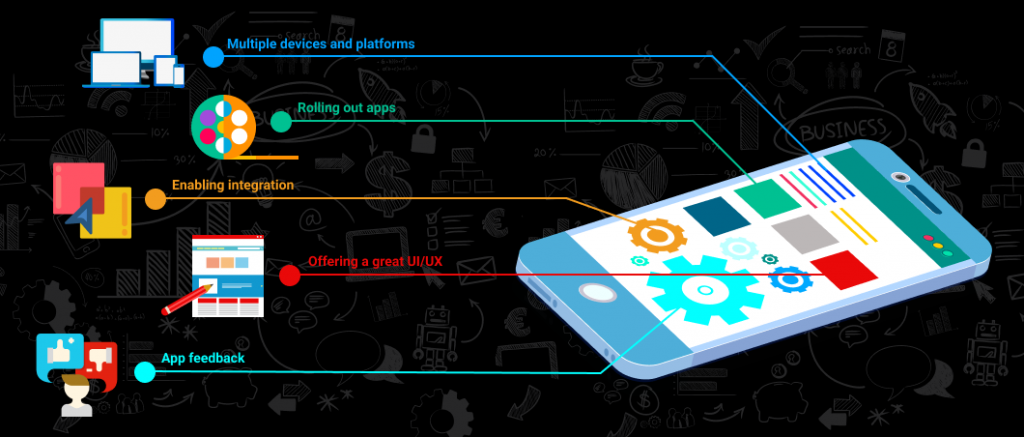Last updated on April 16th, 2024
With the use of smartphones exploding, the demand for mobile apps is growing at a phenomenal rate. With 4.57 billion mobile phone users in the world right now, the mobile app industry is booming. Many companies are looking to develop mobile apps to extend their existing business applications, improve customer service, and smoothen business processes. However, there are several challenges developers must overcome.
Here are the top mobile app development challenges and how you can beat them:
Challenge 1: Developing apps for multiple devices and platforms
In a world with a plethora of mobile operating systems and device types, developing an app for one device and one platform will take you nowhere. As mobile app development technology advances, if your app doesn’t incorporate the latest technology or function according to the OS, memory, and battery of a particular device, it will soon result in poor performance and will be outdone by competition in the long run.
What you can do?
To keep pace with the evolving technological landscape, it is always advisable to use a development environment that allows you to write an app just once and deploy anywhere, and on any device. A flexible system like this enables you to develop apps that can seamlessly run on different device types and platforms and offers much-needed scalability. You can progress from web apps and move to hybrid and native apps – as business needs evolve.
Challenge 2: Rolling out apps quickly
There is a perennial shortage of experienced and skilled mobile developers. Since app development is a highly complex and time-consuming process that could take six months to a year to develop and deploy – rolling out apps quickly is a big challenge. Developers are always pressed for time and in a bid to deploy roll out apps quickly they may be tempted to test less. The quality and performance of the app may be compromised as a result.
What you can do?
Rapid application development tools are a great way to create apps quickly and easily and keep up with the world. Such tools enable you to develop sophisticated, fully-functional web, hybrid, and even native apps far more quickly than traditional development methods. Since these tools use a single app design and codebase, they allow you to quickly create apps for multiple device types – at a fraction of the time and cost.
Challenge 3: Enabling integration
Modern mobile apps often need to access information across databases including location data, language settings, touch ID, passwords, and more. If your mobile app doesn’t offer seamless integration with multiple back-end systems, it runs the risk of not offering the functionalities the users need, rendering it useless in the long run.
What you can do?
Incorporating robust data management practices is key to ensuring integration. By selecting a platform that allows data from different databases to be accessed and brought into the app design, you can ensure integration with several back-end systems and allow quick synchronization of data. Choose a platform that supports industry-standard technologies to ensure all levels of development options are supported: from a no-code or low-code option to custom code – based on your requirement.
Challenge 4: Offering a great UI/UX
User experience and user interface design are prime considerations when building your mobile app and the success of your mobile app rests here. If your app is not easy-to-use and does not offer basic functionalities such as a smooth touch interface or seamless integration, it will confuse and frustrate the user and will die an unlamented death.
What you can do?
Make sure the user interface of your app is clean and simple to use. Ensure it offers a first good impression – it should be attractive and should create a fair level of curiosity in your users’ minds. Also, remember that exceptional user experience is not only about the app’s interactivity and responsiveness but also how quickly it provides the relevant data. Choose a development platform that enables you to build apps that can deal with speed and ensure rich user engagement both.
Challenge 5: Continuously assessing app feedback
Continuously assessing app feedback and using those insights to improve the features and capabilities of your app is tough. If you cannot get a real glimpse of what your customers want from your app, you will never be able to provide them with what they need.
What you can do?
If you want to understand why some users are using one feature three times as often as another or what causes them to stop using your app altogether, you need to leverage data analytics tools to get real-time feedback on how your app is being used. With data analytics, you can analyze what users are doing with your app, how much time they are spending on it, what device they’re using it on, where they are dropping off or getting frustrated, and more. You can use this information to streamline your mobile app and accelerate its future usage and adoption.
Overcome challenges to boost revenue
The mobile app world has been undergoing a massive transformation of late. It is estimated that the mobile app market will reach $189 billion by 2020. Most companies have already built mobile apps for their business and apps are at, or close to, the top of most business strategies. Developing a great mobile app has become critical to business success. In that scenario, knowing the top mobile app development challenges and implementing specific solutions to overcome them may be what helps your organization deliver value and boost revenue.



